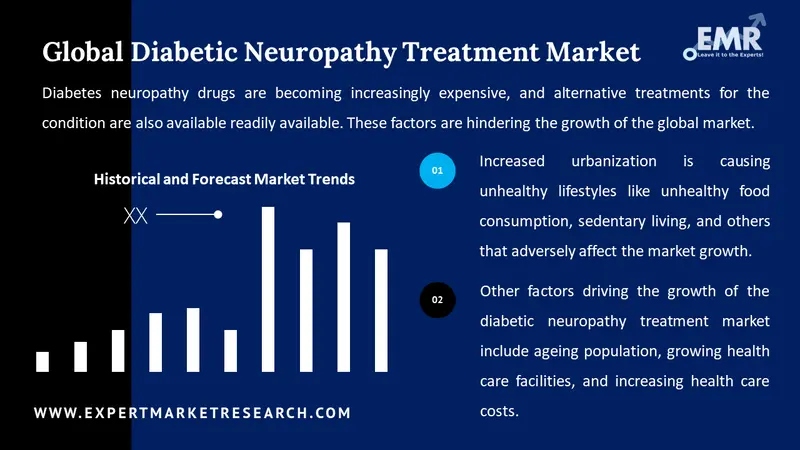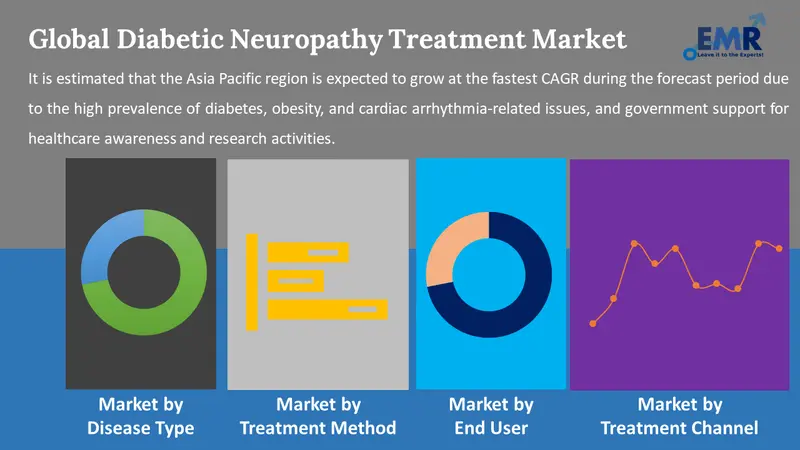
Consumer Insights
Uncover trends and behaviors shaping consumer choices today
Procurement Insights
Optimize your sourcing strategy with key market data
Industry Stats
Stay ahead with the latest trends and market analysis.
Base Year
Historical Year
Forecast Year






The global diabetic neuropathy treatment market is driven by the rising number of hyperglycaemia cases, which was nearly 569.59 million in 2024. The prevalence of the hyperglycaemia is likely to grow at a CAGR of 3% during the forecast period of 2025-2034 to reach approximately 743.19 million cases by 2034.

Read more about this report - REQUEST FREE SAMPLE COPY IN PDF
Diabetic neuropathy is a condition that causes nerve damage in people with diabetes. Nerves are damaged by high blood sugar in diabetics, resulting in diabetic neuropathy.
Legs and feet are the most severely affected body parts in this condition.
There are also symptoms associated with neuropathy, such as pain and numbness, depending on the nerves affected, such as peripheral nerves, autonomic nerves, proximal nerves, and focal nerves.
Following are the different types of diabetic neuropathy:
Worldwide, diabetes treatment is considered a top priority. It is not possible to cure neuropathic changes or provide pain relief with a single treatment. Various approaches are used to manage diabetic neuropathy, including intensive glucose control, treatment of risk factors, and treatment based on pathogenetic mechanisms.
The rapidly rising number of diabetic neuropathies and increased awareness in the next few years will compel major companies to launch new products. Thus, key players in the market are developing technologically advanced products to gain a competitive edge.
According to the global diabetic neuropathy treatment market research report, the market can be categorised into the following segments:

Read more about this report - REQUEST FREE SAMPLE COPY IN PDF
Market Breakup by Disease Type
Market Breakup by Treatment Method
Diabetic Neuropathy Treatment Market Breakup by End-User
Market Breakup by Treatment Channel
Market Breakup by Region
The steep rise in diabetes cases will impact the growth of the market during the forecast period. The complications related to diabetes, cardiovascular diseases, obesity, and other complications related to glucose control contribute to neuropathy development. This includes the development of new products by manufacturers that are effective at treating neuropathy.
Additionally, increased urbanization is causing unhealthy lifestyles like unhealthy food consumption, sedentary living, and others that adversely affect the market growth.
Other factors driving the growth of the diabetic neuropathy treatment market include ageing population, growing health care facilities, and increasing health care costs.
Diabetes neuropathy drugs are becoming increasingly expensive, and alternative treatments for the condition are also available readily available. These factors are hindering the growth of the global market.
Availability of alternative treatments, such as radiotherapy and physical therapy, that may improve patient outcomes, is also obstructing the growth of the market. Other factors that could hamper the market growth include regulations, product recalls, and FDA approval delays.
The increasing diabetes prevalence and incidence cases make North America a major regional market. Various factors contribute to the growth of the market, such as early adoption of drugs, availability of advanced therapies, and the availability of combination drugs.
It is estimated that the Asia Pacific region is expected to grow at the fastest CAGR during the forecast period due to the high prevalence of diabetes, obesity, and cardiac arrhythmia-related issues, and government support for healthcare awareness and research activities.
People with diabetes can be affected by diabetic neuropathy, a chronic debilitating condition. The objective assessment of diabetic neuropathy makes it difficult to diagnose and evaluate in clinical trials. Currently, there is no treatment available to prevent or reverse neuropathy or to relieve pain completely.
Diabetic neuropathy could be treated with Nav 1.7 antagonists, calcium channel blockers, anti-NGF antibodies, and angiotensin II type 2 receptor antagonists.
As part of its neuropathic pain treatment program, Novartis AG introduced Tegerton (carbamazepine), a new epilepsy drug designed to reduce nerve impulses that cause pain in diabetics.
Nucynta ER, a pain reliever derived from opioids, used to treat diabetes-induced nerve damage, was also launched by Janssen Pharmaceuticals.
Among the recommended treatment options for diabetic neuropathy, there are antidepressants like amitriptyline and duloxetine as well as topical agents like gabapentin and pregabalin analogues and opioids for pain relief in neuropathy.
In order to alleviate pain and improve quality of life associated with diabetic neuropathy, more research is needed on the most effective drugs or combinations.
In current therapies, sensory deficits and aetiology are not addressed, so there is an unmet demand for treatment options that target the natural course of the condition.
The outcomes of recent randomized controlled trials show that some of these pathological treatments improve neuropathic endpoints clinically. Patients with neuropathic pain remain undertreated with effective analgesic monotherapy as limited number of patients able to achieve clinically meaningful results.
New pharmaceutical approaches have been expanded due to increased knowledge of neurobiology and phenotypic profiling of neuropathic pain.
A number of promising molecular structures are in clinical development, which will soon improve our therapeutic arsenal of diabetic neuropathy treatments.
In diabetic neuropathy, the disease progresses over time. Medication and lifestyle changes can alleviate this condition. Medications that control diabetes are the most effective in slowing the onset of complications caused by diabetes.
The FDA has approved these drugs for treating diabetic neuropathy:
The report gives an in-depth analysis of the key players involved in the global diabetic neuropathy treatment market, sponsors manufacturing the drugs, and putting them through trials to get FDA approvals. The companies included in the market are as follows:
| REPORT FEATURES | DETAILS |
| Base Year | 2023 |
| Historical Period | 2018-2024 |
| Forecast Period | 2025-2034 |
| Scope of the Report |
Historical and Forecast Trends, Industry Drivers and Constraints, Historical and Forecast Market Analysis by Segment:
|
| Breakup by Disease Type |
|
| Breakup by Treatment Method |
|
| Breakup by End User |
|
| Breakup by Treatment Channel |
|
| Breakup by Region |
|
| Market Dynamics |
|
| Supplier Landscape |
|
| Companies Covered |
|
*While we strive to always give you current and accurate information, the numbers depicted on the website are indicative and may differ from the actual numbers in the main report. At Expert Market Research, we aim to bring you the latest insights and trends in the market. Using our analyses and forecasts, stakeholders can understand the market dynamics, navigate challenges, and capitalize on opportunities to make data-driven strategic decisions.*
Get in touch with us for a customized solution tailored to your unique requirements and save upto 35%!
The market growth is likely to be driven by the rising prevalence of Hyperglycemia, which is likely to grow at a CAGR of 3% during the forecast period of 2025-2034.
The rising cases of diabetes and launch of new products are the major factors driving the growth of the market.
North America has been leading the global market due to early adoption of drugs, availability of advanced therapies, and the availability of combination drugs.
The high cost of the product and the availability of alternatives for diabetic neuropathy are hindering the market growth.
The four types of diabetic neuropathy are peripheral neuropathy, autonomic neuropathy, proximal neuropathy, and focal neuropathy.
Diabetes causes nerve damage, which is known as diabetic neuropathy. Diabetes-related high blood glucose levels, also known as blood sugar, and high levels of fats in the blood, such as triglycerides, can damage nerves over time.
The signs and symptoms of peripheral neuropathy include numbness, prickling, or tingling in your feet or hands that can spread up into your legs and arms. Sharp, jabbing, throbbing, or burning discomfort Touch sensitivity to the extreme.
Datasheet
One User
USD 3,299
USD 2,969
tax inclusive*
Single User License
One User
USD 5,499
USD 4,949
tax inclusive*
Five User License
Five User
USD 6,999
USD 5,949
tax inclusive*
Corporate License
Unlimited Users
USD 8,199
USD 6,969
tax inclusive*
*Please note that the prices mentioned below are starting prices for each bundle type. Kindly contact our team for further details.*
Flash Bundle
Small Business Bundle
Growth Bundle
Enterprise Bundle
*Please note that the prices mentioned below are starting prices for each bundle type. Kindly contact our team for further details.*
Flash Bundle
Number of Reports: 3
20%
tax inclusive*
Small Business Bundle
Number of Reports: 5
25%
tax inclusive*
Growth Bundle
Number of Reports: 8
30%
tax inclusive*
Enterprise Bundle
Number of Reports: 10
35%
tax inclusive*
How To Order
Our step-by-step guide will help you select, purchase, and access your reports swiftly, ensuring you get the information that drives your decisions, right when you need it.

Select License Type
Choose the right license for your needs and access rights.

Click on ‘Buy Now’
Add the report to your cart with one click and proceed to register.

Select Mode of Payment
Choose a payment option for a secure checkout. You will be redirected accordingly.
Track prices with detailed trend reports.

Analyse trade data for supply chain insights.

Leverage cost reports for smart savings

Enhance supply chain with partnerships.

Gain insights to stay ahead and seize opportunities.

Get insights & trends for a competitive edge.

Track prices with detailed trend reports.

Analyse trade data for supply chain insights.

Leverage cost reports for smart savings

Enhance supply chain with partnerships.

Gain insights to stay ahead and seize opportunities.

Get insights & trends for a competitive edge.

Track prices with detailed trend reports.

Analyse trade data for supply chain insights.

Connect For More Information
Our expert team of analysts will offer full support and resolve any queries regarding the report, before and after the purchase.
Our expert team of analysts will offer full support and resolve any queries regarding the report, before and after the purchase.
We employ meticulous research methods, blending advanced analytics and expert insights to deliver accurate, actionable industry intelligence, staying ahead of competitors.
Our skilled analysts offer unparalleled competitive advantage with detailed insights on current and emerging markets, ensuring your strategic edge.
We offer an in-depth yet simplified presentation of industry insights and analysis to meet your specific requirements effectively.



Australia
63 Fiona Drive, Tamworth, NSW
+61-448-061-727
India
C130 Sector 2 Noida, Uttar Pradesh 201301
+91-723-689-1189
Philippines
40th Floor, PBCom Tower, 6795 Ayala Avenue Cor V.A Rufino St. Makati City,1226.
+63-287-899-028, +63-967-048-3306
United Kingdom
6 Gardner Place, Becketts Close, Feltham TW14 0BX, Greater London
+44-753-713-2163
United States
30 North Gould Street, Sheridan, WY 82801
+1-415-325-5166
Vietnam
193/26/4 St.no.6, Ward Binh Hung Hoa, Binh Tan District, Ho Chi Minh City
+84-865-399-124
United States (Head Office)
30 North Gould Street, Sheridan, WY 82801
+1-415-325-5166
Australia
63 Fiona Drive, Tamworth, NSW
+61-448-061-727
India
C130 Sector 2 Noida, Uttar Pradesh 201301
+91-723-689-1189
Philippines
40th Floor, PBCom Tower, 6795 Ayala Avenue Cor V.A Rufino St. Makati City, 1226.
+63-287-899-028, +63-967-048-3306
United Kingdom
6 Gardner Place, Becketts Close, Feltham TW14 0BX, Greater London
+44-753-713-2163
Vietnam
193/26/4 St.no.6, Ward Binh Hung Hoa, Binh Tan District, Ho Chi Minh City
+84-865-399-124
Share